The Tech & Learning 100@30
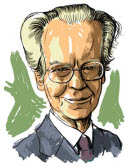
By Matt Bolch; Illustrations By Jay Bevenour
AS PART OF OUR 30TH-ANNIVERSARY CELEBRATION, Tech & Learning is compiling a list of the people most important to the creation and advancement of the use of technology in education. Our first 30 honorees are plucked from the past: the founding fathers and mothers whose inventions, declarations, and theories set the table for where we are today. Here is our list. Did we miss someone? Respond to our reader poll at www.techlearning.com/30thanniversary.
Burrhus Frederic “B.F.”Skinner
Burrhus Frederic “B.F.”Skinner(1904–1990) has been called the most influential psychologist of the 20th century, but the Harvard professor who invented operant conditioning also shaped teaching. Skinner invented the teaching machine, a mechanical device that allowed users to respond to questions and receive rewards for correct responses. In The Technology of Teaching, he outlined five main obstacles to learning (fear of failure, task too big, lack of directions, lack of clear directions, and lack of positive reinforcement) and ways each can be overcome (give immediate feedback, break task into smaller steps, repeat directions as necessary, work from the simple to the complex, and give positive reinforcement).
Craig R. Barrett
Craig R. Barrett(born 1939) retired last year from Intel Corp. as CEO and chairman of the board after a 35-year career, but his passion continues to inspire successive generations of learners. Barrett has taken on national and international roles in the advancement of technology and learning. Until last year he was chairman of the United Nations’ Global Alliance for Information and Communication Technologies and Development, which works to bring computers and other technology to developing parts of the world. He is also a private-sector advocate of a national science, technology, engineering, and math (STEM) education initiative.
Marshall McLuhan
Tools and ideas to transform education. Sign up below.
Marshall McLuhan (1911–1980) was a professor of English literature who pioneered the study of media theory. His 1951 book The Mechanical Bride: Folklore of Industrial Man helped establish popular culture as a field of study, while 1962’s The Gutenberg Galaxy: The Making of Typographic Man examined how communication technology (alphabetic writing, the printing press, and modern electronic media) affects cognition and social organization. McLuhan received wide acclaim for his 1964 book Understanding Media, in which he set out his belief that media, and not their content, should be the focus of study. The popular quotation “The
Sugata Mitra

Sugata Mitra is a professor of educational technology at the School of Education, Communication and Language Sciences at Newcastle University in the UK. While at the National Institute of Information Technologies, where he remains chief scientist emeritus, Mitra ran what is known as the Hole in the Wall experiment to gauge unsupervised learning. A computer was placed in a kiosk in a slum in Kalkajo, Delhi, and children were allowed to use it freely—and did so, proving that children can learn to use computers without formal instruction. Mitra continues to explore what he calls minimally invasive education in his work in education technology for remote and rural areas.
Angus S. King Jr.
Angus S. King Jr.,(born 1944) served two terms as governor of Maine and established the nation’s first one-to-one laptop initiative late in his second term. In 2000, King established the Maine Learning Technology Initiative, whose goal was to provide students with the skills they need to succeed in the 21st century. The effort culminated in the fall of 2002 in each seventh-grade student and teacher’s receiving a laptop; eighth graders followed a year later. King is a distinguished lecturer at Bowdoin College in Brunswick, ME, and a Segal lecturer in American politics at Bates College in Lewiston.
David Thornburg
David Thornburg is director of global operations at the Thornburg Center, which he founded to help clients think intelligently about the future and explore ways telecommunications and multimedia will change the face of learning. His education philosophy is based on the idea that students learn best when they are constructors of their own knowledge. Thornburg also believes that students who are taught in ways that honor their learning styles retain the native engagement with learning with which they entered school. His latest book, When the Best Is Free, explores the world of free open-source software in education, with special emphasis on tools for student use.
Linda G. Roberts

Linda G. Roberts directed the U.S. Department of Education’s Office of Educational Technology from its inception in September 1993 to January 2001 and was the secretary of education’s senior adviser on technology. At the Congressional Office of Technology Assessment before joining the Clinton administration, she directed three landmark studies of technology that became the basis for federal and state law and policy on education technology. Roberts played a key role in developing the E-rate, the program that brings the Internet and advanced telecommunications to the nation’s schools and libraries.
Benjamin S. Bloom
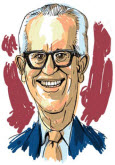
Benjamin S. Bloom(1913–1999), an educational psychologist, and his co-workers at the University of Chicago developed a six-step stairway for learning that helped classify educational objectives and is the basis for the theory of mastery learning. Each successive step builds on the ones below. While other systems for learning have been created, Bloom’s system is easily understood and has been widely applied. Starting from the bottom, the steps are knowledge, which forms the basis for higher levels; comprehension, grasping a concept; application, using what one has learned; analysis, breaking information down; synthesis, putting separate ideas together; and evaluation, judging the worth of material.
Scott McNealy
Scott McNealy(born 1954), chairman and cofounder of Sun Microsystems, was an early advocate of the networked-computer environment. McNealy, who also is chairman of Sun Federal Inc., helped set the industry agenda through his vision of network computing, which has been a guide and a barometer for the direction and pace of technological innovation. Sun Microsystems is responsible for Java, the Solaris operating system, and the Niagara computer chip. McNealy is furthering his commitment to education by working with Curriki, a global education and learning community dedicated to delivering global access to knowledge.
Julie Young

Julie Young is president and chief executive offer of Florida Virtual School, which she helped launch in 1997. The organization, which has a staff of more than 1,200, provides nearly 100 courses to more than 130,000 students annually. Young chairs the United States Distance Learning Association and serves on the boards of the North American Council for Online Learning and the Florida Learning Alliance. She is a member of the Southern Regional Education Board’s Distance Learning Task Force, the Florida TaxWatch Center for Educational Performance and Accountability, and the UT TeleCampus National Advisory Board. In 2003, Young was inducted into the USDLA hall of fame.
M. David Merrill
M. David Merrill is an instructional effectiveness consultant and a professor emeritus at Utah State University. He has been a major contributor to the field of instructional technology, especially in the area of first principles of instruction, as outlined in five steps of engagement. According to these steps, instruction occurs when the learner engages in solving real-world problems, uses existing knowledge as the basis for new learning, receives a demonstration of new knowledge, applies new knowledge, and integrates that knowledge. Merrill teaches online courses at Brigham Young University Hawaii and the University of Hawaii. “Information is not instruction,” Merrill has famously said.
Bob Pearlman
Bob Pearlman is a consultant on strategy for developing 21st-century schools. From 2002 to 2009, he directed strategic planning for the New Technology Foundation, a school-development organization that supports the replication of the New Technology 21st Century High School model in more than 50 communities across the United States. Pearlman consults and speaks on 21st-century learning widely in the United States and the UK. He also consults on strategy for education reform, assisting key reform initiatives around the country.
Al Gore

Al Gore (born 1948) is credited with pushing through Congress legislation that led to the commercializing of the Internet in the early 1990s. As a senator in the early ’80s, Gore was known as an Atari Democrat because of his intense interest in technology as an economic engine. He coined the phrase “information superhighway” and later, under the Clinton administration, was the first U.S. vice president to hold a live interactive news conference on an international computer network. One of the goals of that administration was to connect every U.S. classroom to the Internet by the turn of the millennium.
Alan November
Alan November is the senior partner in and founder of November Learning, a company that empowers educators to apply tools and strategies across the curriculum. November, an international leader in education technology, was among the first to recognize the importance of Web 2.0 technologies in enhancing classroom learning. He is the author of Empowering Students with Technology and a founder of the Stanford Institute for Educational Leadership Through Technology. November, who was selected as one of the original five national Christa McAuliffe educators, leads the Building Learning Communities summer conference, which features presenters and participants from all over the world.
Seymour Papert
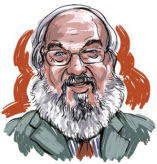
Seymour Papert (born 1928) is a mathematician at MIT and one of the pioneers in the study of artificial intelligence, having founded MIT’s AI Laboratory with Marvin Minsky in the mid-1960s. He also created the Logo programming language, which was designed as a tool for learning by children. The Logo Foundation was created to inform people about Logo and to support the use of Logobased software for learning and teaching. Papert serves on the advisory board of the Lego Mindstorms product line, which was named after his seminal book Mindstorms: Children, Computers and Powerful Ideas and which forms the basis for the First Lego League, which has worldwide participation.
Albert Bandura
Albert Bandura (born 1925) did pioneering research in social learning theory early in his five-decade teaching career at Stanford University. The Alberta, Canada, native is best known in education circles for his research on the role of social modeling in human motivation: for example, the famous Bobo doll experiment in 1961. That test demonstrated that we learn aggression and other behaviors by observing and imitating other people. Bandura has been at Stanford, where he is professor emeritus of psychology, since 1953. His current research focuses on the influential role of people’s beliefs in their ability to exercise control over their lives, especially in the area of self-development.
Robert Mills Gagne
Robert Mills Gagne (1916–2002) began to develop his “conditions of learning” when he was a research manager at the U.S. Air Force and Department of Defense following World War II. Throughout his career, which included a professorship in the educational research department at Florida State University, the educational psychologist greatly added to the knowledge of instructional design. He also applied instructional concepts to computer- based and multimedia learning. His “nine events of instruction” are: gain attention, inform learner of objectives, stimulate recall of prior learning, present stimulus material, provide guidance, elicit performance, provide feedback, assess performance, and enhance retention transfer.
Howard Gardner
Howard Gardner (born 1943) is the John H. and Elisabeth A. Hobbs professor of cognition and education at the Harvard Graduate School of Education. The developmental psychologist is best known in education circles for his theory of multiple intelligences, a critique of the notion that there exists but a single human intelligence that can be assessed by standard psychometric instruments. Gardner has written more than 20 books that have been translated into 27 languages and several hundred articles. Building on his studies of intelligence in Frames of Mind, Gardner has also written Leading Minds, Changing Minds, and Extraordinary Minds.
Nicholas Negroponte
Nicholas Negroponte (born 1943) is founder and chairman of the One Laptop per Child nonprofit association. He is currently on leave from MIT, where he cofounded and directed the media laboratory. Negroponte is a pioneer in the field of computer- aided design and author of the 1995 best-seller Being Digital, which has been translated into more than 40 languages. In the private sector, Negroponte serves on Motorola Inc.’s board of directors and is general partner in a venture capital firm that has provided start-up funds for more than 40 companies, including Wired magazine.
George W. Bush

George W. Bush (born 1946) and Ted Kennedy (1932- 2009) helped shepherd the No Child Left Behind Act of 2001 into law. Bush proposed the sweeping education- reform bill shortly after taking office, and Kennedy was a sponsor of the resulting Senate bill and helped it gain passage. The NCLB touts standards-based education reform because its backers believe that high standards and measurable goals can help students learn. The act requires states to develop basic-skill assessments that are given at specific grade levels in order for the states to receive federal funding. Each state establishes its own achievement standards, however.
Dennis Harper
Dennis Harper is founder and CEO of Generation YES, which teaches and empowers students to solve technology problems in their schools and communities. Generation YES (Youth and Educators Succeeding) grew out of a successful pilot program funded by a Technology Innovation Challenge Grant from the U.S. Department of Education while Harper was with the Olympia (WA) School District. What was then called Generation www.Y was an innovative model of student involvement in infusing schools with technology, driving teachers’ professional development, and improving schools. More than 100,000 teachers and students participated in the project, which was christened Generation YES after the grant ended. Harper served on the ISTE board of directors from 1997 to 1999.
Steve Jobs
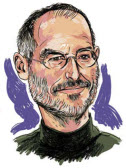
Steve Jobs (born 1955) is an American entrepreneur who cofounded Apple Inc., which marketed the first Apple II and Macintosh personal computers in the late 1970s. Jobs was among the first to see the commercial potential of the computer mouse. He left Apple in the mid-’80s to found NeXT, a computer company specializing in highereducation and business markets. Apple bought NeXT in 1997, and Jobs rejoined the company as its CEO. Apple has regained some of its luster through the introduction of the iPod and the iPhone, both of which are making inroads as educational-content platforms.
LeRoy Finkel
LeRoy Finkel (died 1993) was one of the founders in 1978 of Computer-Using Educators (CUE), a California-based organization that has since gained a national reputation for its leadership in the use of technology in the classroom through both its annual conference and general advocacy. LeRoy was an educator who recognized that technology would become a major factor in the educational process. According to friends and colleagues, he showed the way as teachers struggled to integrate computers into their classrooms, and their lives. He wrote books and articles, praised good products, sniped at bad ones, and scrutinized every aspect of educational computing for the benefit of all. He died (WHEN) In his memory, CUE offers an annual fellowship to promote leadership in the field of educational technology.”
James D. Finn
James D. Finn (1915–1969), an education technology pioneer, viewed technology as much more than machines. After serving in the military in the instructional-aids and training departments at Fort Leavenworth, Kansas, he spent two decades as an education professor at the University of Southern California. Finn sought to elevate audiovisual education to a professional field of study and to base it on research and theory. He believed that technology encompassed processes, management, and human and non-human controls. Finn served as president of both the Association for Educational Communications and Technology and the National Education Association in the early 1960s.
Albert Shanker
Albert Shanker (1928–1997) had activism in his veins. During his undergraduate years at the University of Illinois in Urbana- Champagne, Shanker picketed segregated movie theaters and restaurants and joined several socialist clubs. He taught for seven years in the New York City school system, where he devoted increasing time to union work. He was president of the local United Federation of Teachers for 12 years and of the American Federation of Teachers from 1974 until his death. But Shanker was also a proponent of accountability, calling for national teaching standards, charter schools, responsibility for results, peer review, and minimumcompetency testing of new teachers.
Bill Gates

Bill Gates born 1955) is best known for developing the Windows operating system, which is used in a huge majority of the world’s computers. The PC enables all types of learning in both personal and classroom environments. These days the Harvard dropout and world’s richest man continues to bolster education through the Bill & Melinda Gates Foundation, which supports organized and individual learning across a wide variety of local, national, and global projects. Educational initiatives include a global-libraries award to promote free access to information technology; national grants to support smaller schools and charter schools; and endowed scholarships at U.S. and UK universities.
Jeannette M. Wing

Jeannette M. Wing is assistant director of the Computer & Information Science & Engineering Directorate at the National Science Foundation. A doctoral graduate of MIT, she is also the President’s Professor of Computer Science in Carnegie Mellon University’s computer science department. In 2007, CISE’s more than $527 million budget funded 86 percent of all federally subsidized research in computer science. The organization also contributes to the education and training of future generations of computer scientists and engineers. Wing’s recent research has focused on strengthening software security.
Clifford Stoll
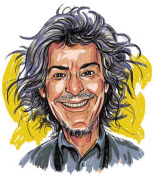
Clifford Stoll is an astronomer at the University of Berkeley but is probably best known as a leading authority on Internet security (he caught the “Hanover Hacker”) and as a bit of a technology curmudgeon. He is the author of High Tech Heretic: Why Computers Don’t Belong in the Classroom and Other Reflections by a Computer Contrarian, which asks readers to check the assumptions that dominate our thinking about technology and the role of computers, especially in the classroom. In his 1995 book Silicon Snake Oil: Second Thoughts on the Information Highway, Stoll warned of the effect the Internet may have on human interaction.
Lajeane G. Thomas
Lajeane G. Thomas is a professor of curriculum, instruction, and leadership at Louisiana Tech University who has helped prepare teachers for the 21st century. She is a past president of the International Society for Technology in Education and a longtime chair of its accreditation and standards committee. Thomas directed ISTE’s National Educational Technology Standards Project, which was funded by the U.S. Department of Education’s Preparing Tomorrow’s Teachers to Use Technology grant, and served on the National Council for Accreditation of Teacher Education’s technology task force, which developed the report “Technology and the New Professional Teacher: Preparing for the 21st Century Classroom.”
